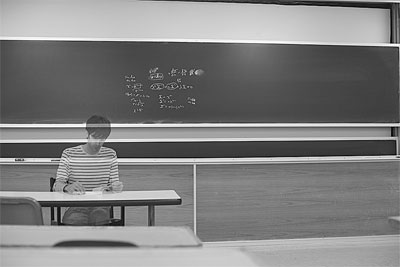- California Assembly OKs highest minimum wage in nation
- S. Korea unveils first graphic cigarette warnings
- US joins with South Korea, Japan in bid to deter North Korea
- LPGA golfer Chun In-gee finally back in action
- S. Korea won’t be top seed in final World Cup qualification round
- US men’s soccer misses 2nd straight Olympics
- US back on track in qualifying with 4-0 win over Guatemala
- High-intensity workout injuries spawn cottage industry
- CDC expands range of Zika mosquitoes into parts of Northeast
- Who knew? ‘The Walking Dead’ is helping families connect
The High School Epidemic: No-Sleep-itis
That’s how many hours of sleep high school students should be getting per night, according to researchers.
However, for students, this is a fantasy. Most get closer to six hours of sleep — some even less.
“I get around four,” said West Ranch junior Abanoub Mikhail. “Balancing school, ACT preparation and volunteering is hard.”
Mikhail is not alone in his struggle; a study in the Journal of Adolescent Health revealed that only eight percent of students were getting enough sleep. Teachers are noticing this as well.
“Every teacher can tell you that they have students that fall asleep,” said Sara Ehrman, Psychology teacher at West Ranch.
For some, this lack of sleep is due to homework. Students also have standardized tests to worry about. Others are caught in a cycle of procrastination, distracted by the leisure of the internet, friends, and social media.
A lack of sleep among teens may also be attributed to a biological factor.
“It has to do with melatonin production,” said Ehrman. “In adolescents, melatonin starts later and stops later than adults.”
This is why adolescents sleep and awake later in relation to their adult counterparts.
These factors all contribute to making the nine hours of sleep unattainable.
Losing sleep causes damage.
In the short term, a lack of alertness during the day has the potential to lead to serious accidents, and not getting a good night of sleep results in cognitive impairment; the brain is left uncharged. Despite these short-term effects, students have learned to fight these symptoms off, or have simply adapted.
“I’m used to it now,” said Mikhail.
Though this is the case for many, students do not recognize the long-term harms involved. Sleep deprivation is associated with high blood pressure, heart problems, stroke, obesity, and mental issues.
So what can students do to get their nine hours?
According to Ehrman, “catching up” by sleeping in on the weekends is not a good method. It may actually disrupt our circadian rhythms by shifting sleep patterns. Rather, students need to set a static bedtime, which will set their body clocks to a certain regimen. This stability allows one to be in more control of his or her body. Sleep deprivation is an insidious epidemic with serious consequences, but it can be prevented. Avoid procrastination, sleep at a set time, and reap the full benefits of sleep.
 |
Min Jae Kang West Ranch High School 11th Grade January 27, 2015 |


















kelly
November 27, 2017 at 11:54 AM
yes..I like the basic concepts behind Second Life but it seems incredibly outdated and when I played it was intensely non-intuitive / user friendly to an extent that made EVE look like a game for toddlers. thanks from
togel online